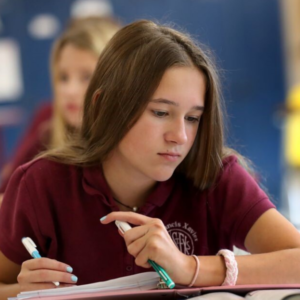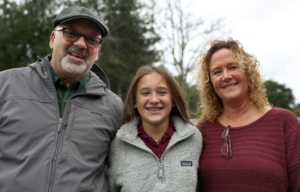Mass. public schools deny Catholic, Jewish schools aid for special education
Mass. public schools violated law by denying Catholic, Jewish schools aid for special education, US officials say
Originally Published in the Boston Globe
By James Vaznis Globe Staff, October 15, 2019, 7:09 p.m.

For three years, Noella Canastra has been traveling about 11 miles from St. Francis Xavier Elementary School in Acushnet to receive math tutoring and other help in Dartmouth. DAVID L. RYAN/GLOBE STAFF
The US Department of Education has found that public school districts across Massachusetts and state education officials have violated federal law for years by denying services and government aid to students with disabilities who attend Catholic, Jewish, and other private schools, according to a copy of the decision obtained by the Globe.
Consequently, local districts and the state could wind up owing private schools millions of dollars in services they failed to provide over the past five years. Under federal law, public districts must spend federal special-education aid on children with disabilities attending all schools in their communities, including private and religious ones.
The amount owed to private schools could be as much as $120 million, according to a coalition of Catholic and Jewish schools, which filed the complaints that led to the federal ruling. State education officials disagreed with that estimate, noting the amount hasn’t been calculated. Any money owed would have to come in the form of special-education services provided by the school systems.
“It bothers me to think . . . how many kids didn’t get the services they required and how that has impacted their lives,” said Stephen Perla, superintendent of schools for the Diocese of Fall River, a coalition member. “I worry about those kids.”
Massachusetts education officials said they already have taken steps to remedy the problems, including updating their guidelines in 2017 for how school districts should comply with the federal requirements.
“The Department of Elementary and Secondary Education is focused on helping school districts provide quality services to students with disabilities, including students educated in private settings, consistent with state and federal law,” said Jacqueline Reis, a state education spokeswoman.
The decision sheds light on a little-known part of the federal Individuals with Disabilities Education Act, which aims to improve the educational outcomes of students with disabilities, even when parents send their children to religious schools. Local districts are required to locate all students with disabilities attending private schools in their community — regardless of whether they are residents — and use a portion of their federal special-education funding to provide them services.
But since federal dollars are limited, public schools can limit services to benefit the broadest number of students with disabilities. The services, provided directly at private schools, often include academic tutoring, speech therapy, and other supports.
Many districts have been confused about their responsibilities under federal law because Massachusetts education officials have long emphasized state requirements, which guarantee a higher standard of education and investment of public dollars but also establish different requirements for which students they are responsible for serving and where.
Specifically under state law, local districts must cover the full cost of special education for all students with disabilities who live within their borders and want the services regardless of whether they attend private schools in their community or elsewhere. Those services, however, can be provided only at public schools or neutral sites because the state constitution doesn’t allow local and state dollars to be spent on private schools.
While the Massachusetts requirements are more generous, families who send their children to out-of-town private schools say it creates huge burdens because their children must return to their hometown for special education, causing them to miss classes. Private-school families also say they often encounter resistance for services from public school administrators.

Roberta Canastra, shown with her daughter, Noella, and her husband, Richard, said that getting Dartmouth to agree to special-ed services has been an annual fight. DAVID L. RYAN/GLOBE STAFF
“My feeling is I should have every right to educate my child at a religious school, and my daughter should not have to suffer by not receiving services,” said Roberta Canastra of Dartmouth, who has been fighting for services for her 13-year-old daughter for three years. “I can’t tell you how many times I would be in a meeting in Dartmouth and someone would ask ‘Are you sure you don’t want her to go to a public school — it would be a lot easier.’ ”
For the past three years, her daughter, Noella, has traveled about 11 miles from St. Francis Xavier Elementary School in Acushnet to receive math tutoring and other help in Dartmouth. Her mother said she makes the arrangement work because she has the time to pick up her daughter, but hates that she has missed her regular classes.
Canastra also said getting Dartmouth to agree to the services has been an annual fight, involving mediation. This school year Dartmouth has refused to offer anything.
A coalition of Catholic and Jewish schools decided to go after the federal funding four years ago. Members said public schools were generally not sharing their federal special-education dollars with private schools and filed a complaint with the US Education Department, which issued a finding of noncompliance a year later.
The amount of money at stake is sizable in many districts, such as Milton, which is receiving $1.3 million in federal special-education aid this year to serve public- and private-school students with disabilities; Worcester, $7.8 million; and Boston $17.5 million.
But problems persisted, prompting the coalition to file complaints against the state and 27 school systems, including Holyoke, New Bedford, and Dennis-Yarmouth, with an investigative arm of the Massachusetts Education Department. Unsatisfied with the agency’s investigation, the coalition appealed to the US Education Department, which ruled in its favor in August.
“We tried in so many different ways to work directly with the state to right this wrong and for so many different reasons we weren’t able to get there,” said Nancy Kriegel, senior director of strategic partnerships for the Combined Jewish Philanthropies.
The decision faulted the state’s investigation as “insufficient” and knocked the state for failing to provide local districts with proper guidance on the federal requirements. It also found local districts didn’t understand their legal obligation to share the federal funds or how to divvy them up.
“Calculation methods were flawed in multiple ways, and it is possible that none of the calculations were accurate,” according to the decision.
Consequently, the federal education department has ordered the state’s 400 school districts to cull through five years of records to accurately count the number of students with disabilities enrolled in private schools, determine the extent of services provided, and figure out how much federal aid, if any, was spent.
Even then, an accurate count may not be possible because private school representatives say districts were disputing disabilities of private school students, questioning the need for services, or refusing to meet with families to discuss program options. Currently about 7 percent of the state’s approximately 74,000 private-school students have documented disabilities, while representatives for Catholic and Jewish schools say they suspect the percentage is likely closer to the state average for public schools. Eighteen percent of the state’s 925,000 public-school students have a disability.
Salomon Chiquiar-Rabinovich said his 10-year-old daughter, whose disabilities fall under the “dyslexia umbrella,” has made tremendous progress in her classes thanks to the special-education services she is receiving at Maimonides School, a modern Orthodox Jewish day school in Brookline, a community that advocates say does a good job of sharing its federal funds.
Initially when she was diagnosed, Chiquiar-Rabinovich said, she received special education at a Brookline public school. He said he was satisfied with the support she was receiving, but it came at the expense of her missing classes at Maimonides — a sacrifice he didn’t think she should have to make.
“The more assistance that can be provided, the better it will be for children,” he said. “It can be very demoralizing for students if they don’t get the special attention they need.”
